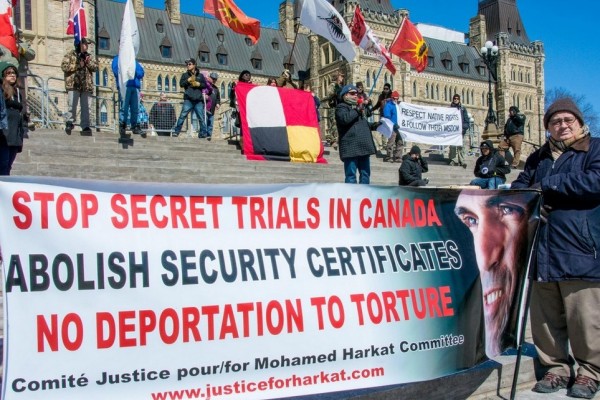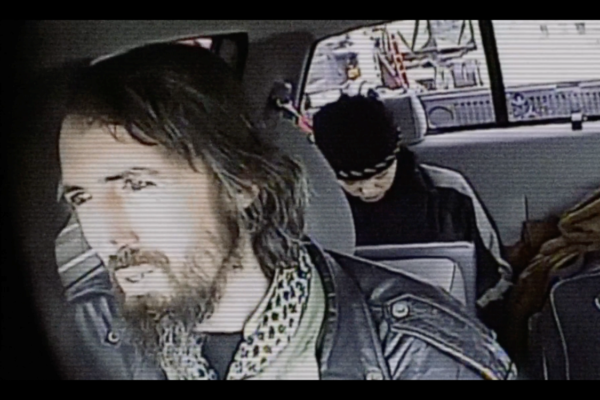Inventing Enemies: Project Thread & Canadian “Security”

Photo from Wikimedia Commons.
When Canadians learned of the treatment faced by Maher Arar and William Sampson in foreign jails, they responded with indignation. What countries were these where Arar and Sampson could be held on such flimsy suspicions of terrorist activities, then tortured and finally deported without so much as an apology?
However, any smugness Canadians might feel that similar travesties could not happen in Canada would be sorely misplaced. In post-9/11 Canada, even minor immigration irregularities can quickly become the basis of suspicions of terrorist activities, depending on your religion and country of origin.
The terrible consequences for immigrants of this new arrangement are obvious with the seven-month-long Project Thread investigation by the RCMP’s Public Security and Anti-Terrorism unit (PSAT) and Citizenship and Immigration Canada (CIC).
At the same time Arar and Sampson were being tortured in Syria and Saudi Arabia, 22 Pakistani (and one Indian) nationals were targeted because they were Muslim and Pakistani, and jailed on suspicion of terrorist activities.
The multi-million-dollar investigation, with its enormous resources, wide-ranging search-and-seizure powers and seven-month time frame, came up empty. In fact, RCMP Commissioner Giuliano Zaccardelli has admitted that “there is absolutely no evidence to suggest that there is any terrorist threat anywhere in this country related to this investigation.” CSIS and RCMP incompetence might be laughable if it didn’t have such serious consequences for the falsely accused.
Grasping at “Thread”: The Ottawa Business College
In the middle of the night of August 14, 2003, the RCMP burst into apartments around the Greater Toronto area, dragging forty to fifty Pakistani men out of bed at gunpoint. The discovery of an “Al-Qaeda sleeper cell” was announced. The common thread was that the men had at some point either studied at or put Ontario Business College (OBC) down on a student-visa application, or were acquainted with someone who had. Supposedly, an “alert” immigration official got curious when she received an application for permanent residency in which the applicant claimed to have attended the OBC. When she attempted to contact the OBC and failed to find it, federal officials initiated Canada’s first major terror investigation of the post-9/11 era.
Further evidence considered germane to suspicions of terror, according to PSAT’s twisted logic, was a Lufthansa poster given to one man by his father, an airport baggage handler. Used to cover a bare wall in the apartment, in official reports it became an “airplane schematic”! Another man was said to have been seen walking on the shores of Lake Ontario near the Pickering Nuclear Power Plant — when he was actually in Pakistan. These examples are representative of the quality of evidence collected to back up terror suspicions. PSAT investigated only 31 cases out of the more-than-400 students on file at the OBC.
How did PSAT choose which files to pursue? They only pursued the Muslim and Pakistani cases. Further, the RCMP and the CIC were very careful only to go after men whose status was not regular. In some apartments they did not arrest landed immigrants who had also attended the OBC, while in other apartments roommates who had never heard of the OBC, but who were Pakistani or Muslim and who claimed refugee or visa-student status, were detained. The most important criterion for detention was not whether an individual had actually done something, or whether there was any evidence that they might be planning something, but simply that they were not landed or a citizen.
The Community Response: Being Pakistani Is Not a Crime
Into this mix stepped an energetic coalition of activists from the South Asian community, unions, the Ontario Coalition Against Poverty, socialists, communists and peace activists determined to protect the men from false accusations.
Formed within a week of the arrests, “Project Threadbare” (a play on the RCMP’s Project Thread) organized a wide array of protests, public forums and pickets in support of the detainees.
It soon became clear that many of the men had no money for legal representation and no one who could bail them out of detention. Many friends had been scared off by the terrorist allegations and RCMP visits to their homes, were not landed immigrants, or had insufficient funds to post bail. Threadbare organized legal support and bail persons, attended detention-review hearings, visited the men in jail, filed complaints about their treatment by prison guards, and launched a campaign to have them transferred out of maximum-security prisons into the usual centre for immigration-related detentions (the ironically named “Celebrity Inn”).
By early September it became clear to nearly everyone concerned with the case that what the government had on its hands was not a sleeper cell but a bunch of international students, security guards and gas-station attendants. However, by this time CIC had held them in detention for a month and had subjected them to numerous interviews without lawyers present. The PSAT had interviewed acquaintances and employers and had confiscated documents, computers and personal possessions.
It was not surprising that in this context CIC department officials could dig up some violation — no matter how minor — upon which to base a deportation order. For example, some men had failed to notify regarding a change of address, or had enrolled in a master’s program when their student visa had been issued only for an undergraduate program at the same university. Suddenly a major terrorism investigation had become a collection of routine immigration cases, and, by the middle of November, ten men were deported to Pakistan under a cloud of suspicion.
Criminalizing International Students
The Project Thread detainees drew the suspicion of terrorism investigators because they lived in groups of four or five in “sparsely furnished apartments” at a “minimal standard of living.” That poverty and the poor living conditions students face due to the high cost of international tuition fees and Toronto’s tight rental market should then be used as a basis to profile them was particularly galling to Threadbare members.
We pointed out that it was the Harris/Eves government that was responsible for the explosion in private educational institutions (including the OBC, founded in 1996). Further, it was the Ontario Ministry of Education that had failed in its responsibility to regulate these schools. The ministry had only five staff persons to oversee 450 institutions. This resulted in a situation where the OBC was able not only to sell diplomas, but also to defraud international students of tens of thousands of dollars in tuition. A number of the detainees had lost over $5,000 each to the OBC after the school accepted their fees and then closed up shop in 2001. The former owner of the school, Luther Samuel, has never faced any charges, but kindly submitted affidavits, which were used by the CIC in the deportation cases. The provincial government’s complicity in the facts of the case, however, did not stop Premier Eves from promising to crack down on “immigrant criminals” in the fall election campaign.
American Pressure and the Canadian Government
The story of the “alert” immigration official is curious. It seems just as likely that the probe was initiated at the suggestion of U.S. Homeland Security Secretary Tom Ridge.
In detention-review hearings, it was mentioned that a former OBS teacher had been picked up and detained in California, and that a number of the men had been denied visas to the United States. This may have brought them to the attention of the Department of Homeland Security. It is in part to get some answers about U.S. involvement in the investigation that Project Threadbare is calling for a full and open public inquiry.
What is clear is that the Canadian government has long been under pressure to harmonize border regulations and immigration laws. The government’s economic strategy rests upon the $1 billion per day in bilateral trade that crosses the border, and ensuring that nothing impedes its movement. The Canadian government needs to be seen as reacting appropriately to perceived security threats, as well as acting on American tips. Our economic dependence on the U.S. acts therefore as an incentive for the sort of wild-goose chase that is Project Thread — as long as the domestic political fall-out is manageable.
Exonerate, Compensate, Apologize, Naturalize
For the ten men deported in October and November, the ordeal is not over. They have faced ongoing harassment in Pakistan. Three of the deportees were met by federal police in Karachi and interrogated for 16 hours, and were then only released on bail and told they are still under investigation. Another man was beaten by four men with cricket bats who repeatedly called him a terrorist. The Pakistani government has turned over hundreds of suspected terrorists to the U.S., and has a poor record itself of granting terror suspects fair trials. Both facts are reasons to fear for the men’s long-term safety. In spite of the growing evidence of the many threats to their safety should they return to Pakistan, CIC continues to push for the deportation of the 13 men remaining in Canada.
Project Threadbare is demanding that the Martin government release a statement that exonerates all the men from suspicions of terrorism and issue an apology. The men deserve compensation for the ordeal through which they have been dragged. Finally, the men remaining in Canada should be allowed to remain on Minister’s permits on humanitarian grounds. Our government has a responsibility to ensure the safety of the deported men in Pakistan and a duty to issue them Minister’s permits if the men request them.
Security For All, Civil Liberty For All
The societal costs of the “war on terror” fall almost entirely on the Canadian Muslim community, and are borne further by community members neither yet landed nor citizen. As the first major terror investigation carried out in post-9/11 Canada, Project Thread is illustrative of where we are headed if the government continues to trade Canadian civil liberties for American trade dependence. Unless we stop targeting Muslims and immigrants from particular countries, Canada will continue to move closer to the Syrian and Saudi Arabian models of justice. Rather than contribute to the security of all members of the Canadian community, Citizenship and Immigration Canada, the RCMP and CSIS have quite possibly issued the death sentence for one or more of these men.
Govind Rao is a member of Project Threadbare. He lives in Toronto.
This article appeared in the January/February 2004 issue of Canadian Dimension .










